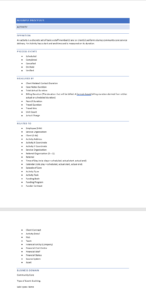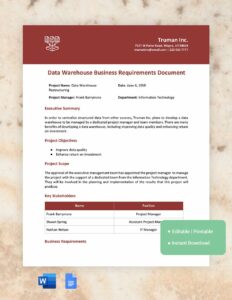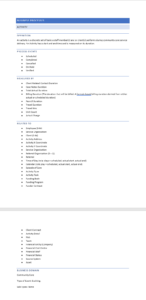A data mart is a smaller, subject-specific subset of a data warehouse that is designed to support specific business needs. It is essential for gathering and organizing relevant data from different sources to facilitate better decision-making at the departmental or functional level.
To ensure effective data mart implementation, a comprehensive data mart requirements template is indispensable.
This template outlines the essential details and requirements of the data mart project, providing a clear roadmap for its design and development.
Key Components of a Data Mart Requirements Template
A well-structured data mart requirements template should include the following key components:
- Project Objectives: Clearly define the business objectives and goals to be achieved through the data mart.
- Data Scope: Specify the sources and types of data to be included in the data mart, along with any data transformation or manipulation requirements.
- User Requirements: Outline the specific needs and expectations of the users who will access the data mart, including reporting, analysis, and visualization requirements.
- Technical Specifications: Describe the hardware, software, and network infrastructure requirements for the data mart, including data storage, processing, and security.
- Project Timeline and Budget: Establish a realistic timeline for the data mart project and estimate the associated costs.
Benefits of Using a Data Mart Requirements Template
Adopting a comprehensive data mart requirements template offers several advantages:
- Clear Communication: Ensures clear and concise communication of project requirements among stakeholders, reducing misunderstandings and misinterpretations.
- Stakeholder Alignment: Helps align the expectations of all stakeholders, including business users, IT professionals, and data analysts, ensuring that the data mart meets their specific needs.
- Improved Planning: Facilitates detailed planning for the data mart project, considering all aspects of design, development, and implementation.
- Reduced Risk: Minimizes project risks by thoroughly defining requirements and addressing potential challenges early on.
- Faster Implementation: Streamlines the data mart implementation process by providing a structured framework.
Conclusion
Utilizing a well-defined data mart requirements template is crucial for the success of any data mart project. It provides a solid foundation for gathering and organizing relevant data, facilitating effective decision-making, and ensuring that the data mart aligns with specific business requirements. By using a data mart requirements template, organizations can streamline the project, reduce risks, and maximize the value of their data.
Furthermore,を活用して, organizations can ensure that their data mart meets the evolving needs of the business over time, supporting continuous improvement and data-driven decision-making.


